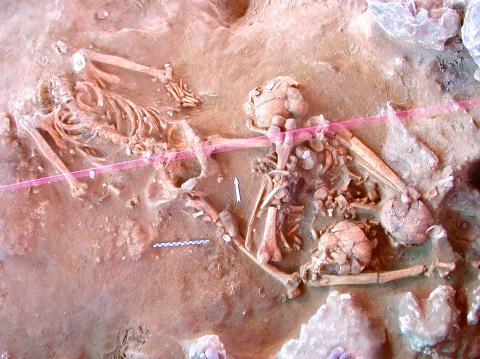Ancient DNA has revealed the first inhabitants of Vanuatu and Tonga came from Asia, not other Oceanic populations as has long been assumed, a study published yesterday found.
The study sheds light on the last great human migration into unpopulated lands, when a people called the Lapita fanned out into the South Pacific about 3,000 years ago.
Little is known of the mysterious culture beyond their distinctive dotted pottery and the human remains they left behind.

Photo: AFP / Australian National University
Scientists had speculated that they were an offshoot of Australo-Papuan populations of Australia, New Guinea and the Solomon Islands, who arrived in the region 40,000 to 50,000 years ago.
However, analysis of three skeletons from Vanuatu’s oldest cemetery found they came from Asia, with no trace of DNA from their Pacific neighbors.
“Their original base population is Asian. They were straight out of Taiwan and perhaps the northern Philippines,” said Matthew Spriggs, a professor at the Australian National University and one of the researchers involved in the study.
“They traveled past places where people were already living, but when they got to Vanuatu there was nobody there. These are the first people,” he said.
Spriggs said another DNA sample from a Lapita skeleton in Tonga returned similar results.
“We know this because testing conducted by two different laboratories in the United States and Germany confirm that the samples are of the same people,” he said.
He added that it now appeared the Asiatic Lapita first colonized the South Pacific, then intermingled with a second wave of Australo-Papuan settlers to create the region’s modern genetic mix.
Ron Pinhasi, a professor at University College Dublin, said the study, published in Nature, was made possible by improved methods of extracting material from skeletal remains.
“The unexpected results about Oceanian history highlight the power of ancient DNA to overthrow established models of the human past,” he said.

‘ABUSE OF POWER’: Lee Chun-yi allegedly used a Control Yuan vehicle to transport his dog to a pet grooming salon and take his wife to restaurants, media reports said Control Yuan Secretary-General Lee Chun-yi (李俊俋) resigned on Sunday night, admitting that he had misused a government vehicle, as reported by the media. Control Yuan Vice President Lee Hung-chun (李鴻鈞) yesterday apologized to the public over the issue. The watchdog body would follow up on similar accusations made by the Chinese Nationalist Party (KMT) and would investigate the alleged misuse of government vehicles by three other Control Yuan members: Su Li-chiung (蘇麗瓊), Lin Yu-jung (林郁容) and Wang Jung-chang (王榮璋), Lee Hung-chun said. Lee Chun-yi in a statement apologized for using a Control Yuan vehicle to transport his dog to a

Taiwan yesterday denied Chinese allegations that its military was behind a cyberattack on a technology company in Guangzhou, after city authorities issued warrants for 20 suspects. The Guangzhou Municipal Public Security Bureau earlier yesterday issued warrants for 20 people it identified as members of the Information, Communications and Electronic Force Command (ICEFCOM). The bureau alleged they were behind a May 20 cyberattack targeting the backend system of a self-service facility at the company. “ICEFCOM, under Taiwan’s ruling Democratic Progressive Party, directed the illegal attack,” the warrant says. The bureau placed a bounty of 10,000 yuan (US$1,392) on each of the 20 people named in

The High Court yesterday found a New Taipei City woman guilty of charges related to helping Beijing secure surrender agreements from military service members. Lee Huei-hsin (李慧馨) was sentenced to six years and eight months in prison for breaching the National Security Act (國家安全法), making illegal compacts with government employees and bribery, the court said. The verdict is final. Lee, the manager of a temple in the city’s Lujhou District (蘆洲), was accused of arranging for eight service members to make surrender pledges to the Chinese People’s Liberation Army in exchange for money, the court said. The pledges, which required them to provide identification

INDO-PACIFIC REGION: Royal Navy ships exercise the right of freedom of navigation, including in the Taiwan Strait and South China Sea, the UK’s Tony Radakin told a summit Freedom of navigation in the Indo-Pacific region is as important as it is in the English Channel, British Chief of the Defence Staff Admiral Tony Radakin said at a summit in Singapore on Saturday. The remark came as the British Royal Navy’s flagship aircraft carrier, the HMS Prince of Wales, is on an eight-month deployment to the Indo-Pacific region as head of an international carrier strike group. “Upholding the UN Convention on the Law of the Sea, and with it, the principles of the freedom of navigation, in this part of the world matters to us just as it matters in the